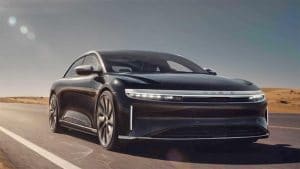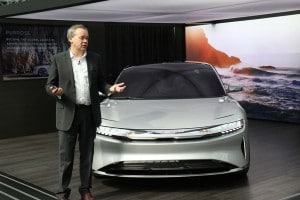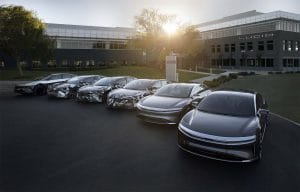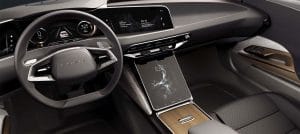
Lucid executives claim that their first expected product, the Air, will travel 517 miles on a single charge.
The debut of the production Lucid Air is still a month away but the EV startup has been ramping up its pre-launch PR campaign – and the latest news is enough to get us to sit up and pay attention.
There has been a steady ramp up of range as manufacturers work to push their EVs into the mainstream. Tesla recently nudged 400 miles with a special edition Model S, while Cadillac intends to top 300 miles with even the base version of its Lyriq SUV. But it’s going to be a challenge for anyone to top the numbers Lucid is quoting – at least if they hold when final testing is completed.
The company claims that a pre-production version of the new Lucid Air managed to top 500 miles using a test meant to simulate the EPA driving cycle.
(Lucid starts taking $1,000 deposits for its new Air EV.)

Peter Rawlinson, CEO and CTO of Lucid Motors, said he’s “delighted” by the 517-mile rating that FEV North America applied to the car’s range.
“I’m delighted that the Lucid Air has been independently verified by FEV (North America) to achieve an estimated EPA range of 517 miles, and that this landmark in the history of EV development has been achieved entirely through Lucid’s in-house technology,” said Peter Rawlinson, CEO and CTO of Lucid Motors.
Rawlinson gave credit to Lucid’s’ “race-proven” battery pack, miniaturized motors, its unusual, 900-volt electric architecture and other factors for yielding what could be the new benchmark in EV range for a street-legal automobile.
The figure was ascertained by FEV North America, a suburban Detroit technology firm that has been working with a number of automakers entering the EV market.
“FEV has tested many vehicles across a wide range of consumer and industrial use cases, with electric vehicle development and testing as one of our core competencies,” said Dean Tomazic, the firm’s chief technology officer. “We are impressed by the pace of progress in this area, as exemplified by our testing of the Lucid Air, and are proud to play a vital role in the development of e-mobility.”
What’s especially surprising is that it was only days ago that Lucid was teasing a range figure of “just” 442 miles.

The Lucid Air has been going through extensive testing, including a minor tweak of its exterior as it seeks the finish line.
While specific technical details weren’t released, TheDetroitBureau.com confirmed the lithium-ion battery pack that will be used for the Lucid battery-electric sedan come from Atieva, the startup’s technology unit. It’s had plenty of opportunity to work on the technology, providing the batteries used by the entire field of competitors in Formula E.
The race series has made a number of improvements since it debuted in 2018, notably in battery technology. Until last year, range was so limited that drivers had to pit midway through a race and jump into a second car. As of 2019, energy density was increased enough to finish a race with a single vehicle.
(Former Tesla executive lands at Lucid Motors.)
Another significant detail is Lucid’s decision to go with a 900-volt electrical architecture, one of the highest-energy systems yet used. That allows for a variety of improvements, including performance, as well as range and charging times – though it also increases the cost of a vehicle.
As with Tesla – which will be its top competitor – Lucid plans to offer a variety of configurations of the Air model, including one expected to deliver around 1,000 horsepower. That should help it more than match the launch of the Model S performance package which can hit 60 in under 2.5 seconds.
Lucid has heavily promoted the fact that, at least in prototype testing, the Air can hit a top speed of 235 mph. Where the production model will come in has yet to be revealed.
Among other things, Lucid is hinting that it plans to top the capabilities of the Tesla Autopilot system with its own semi-autonomous technology. Where Tesla is relying on cameras and radar, Lucid is adding high-resolution LIDAR that, many experts believe, is necessary to provide an extra layer of security and functionality.
Lucid has, during the past few years, indicated it will get to Level 3, or full hands-off driving. It now says it won’t be there at launch but expects to improve Air’s capabilities in the future using over-the-air upgrades.
Visually, there’ve been some updates to the Lucid Air since the first prototype was revealed nearly six years ago. That’s the work of Derek Jenkins, the one-time Mazda designer who now runs Lucid’s styling studio.
In terms of battery packs the carmaker has said that it will offer both 100 and 130-kilowatt-hour options. What’s unclear is whether the larger package somehow pulled off the 517-mile test run or if there’s something even bigger that will be on the option list.
Pricing is another uncertainty. The most powerful and longest-range version – or versions – of the Lucid Air will top $100,000, all but certainly, with a base price widely reported to be in the $65,000 range.
The BEV is set to roll out of an all-new plant in Arizona set to employ about 2,000. Lucid has yet to give a clear sense of how many battery-sedans it hopes to produce each year.
(Lucid Secures $1 Billion Investment from Saudis.)
We hope to find out the answer to these and other questions when, on Sept. 9, the Lucid Air makes its formal debut online.


